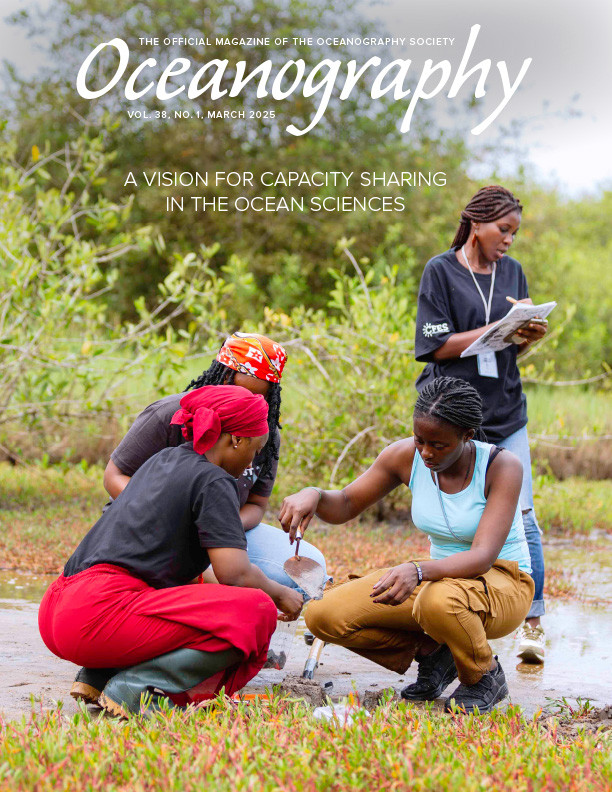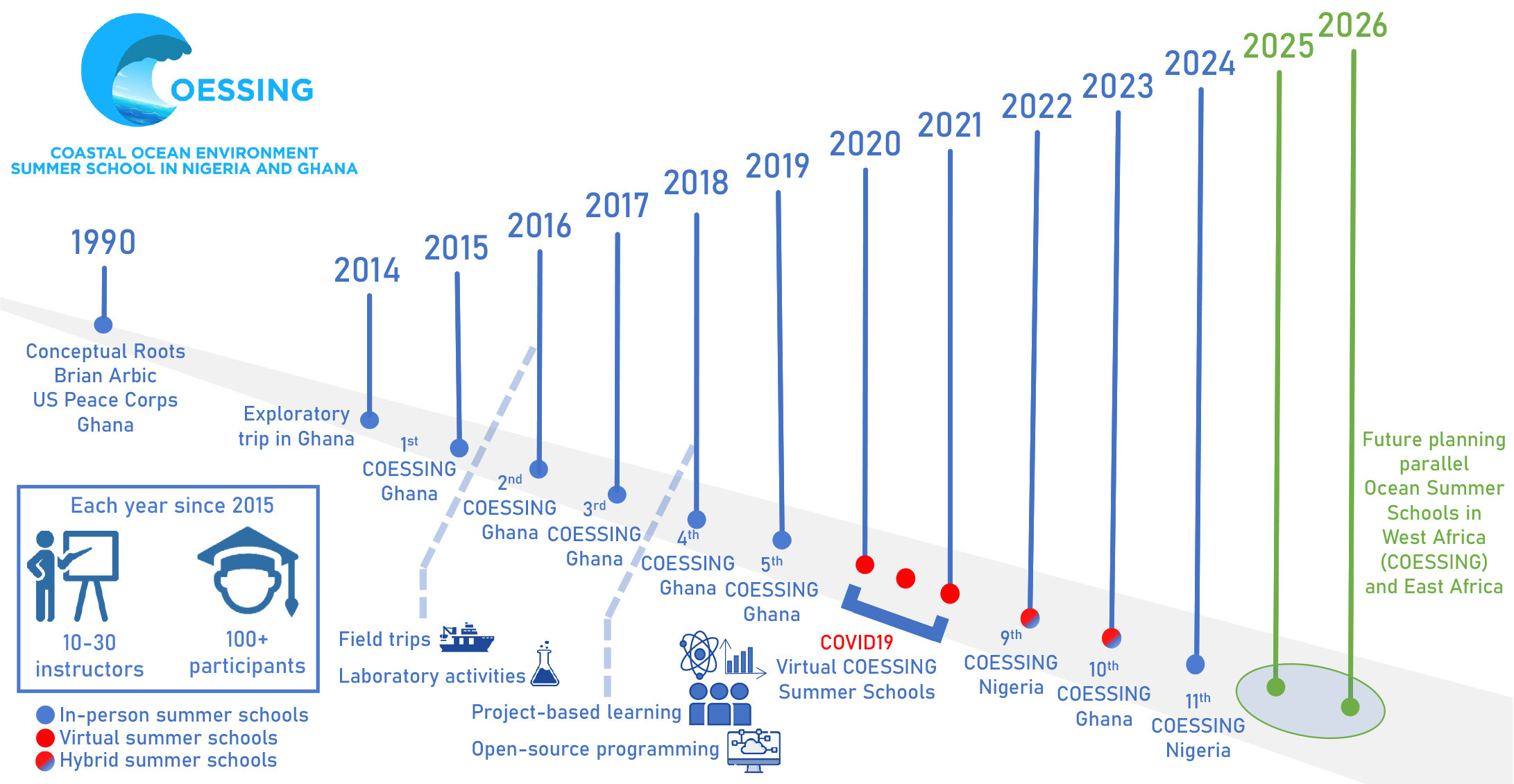School Goals, Vision, and Mission
The primary goal of the Coastal Ocean Environment Summer School In Nigeria and Ghana (COESSING) is to provide a platform where scientists from West Africa and the Global North can assemble. Scientific collaboration is impossible unless people first meet, preferably in person, and bringing scientists from the Global North to Africa provides an opportunity for such meetings to take place. Our experience has been that many scientists in West Africa and the Global North are interested in forming mutually beneficial scientific collaborations but need a forum for initiating them. Our vision is to address the conditions that have historically led to the exclusion of African representation in science and to empower current and future generations of African scientists through bringing them into contact with scientists from elsewhere. Our mission is to provide a platform for promoting African science in sync with the United Nations Sustainable Development Goals (SDGs) 14 and 17.
Prelude to the School
The story of the founding of COESSING illustrates how connections between people from different cultures can have enduring impact. More than 30 years ago, COESSING co-founder and lead author of this article Brian Arbic served as a US Peace Corps volunteer in northern Ghana. There he taught mathematics and physics in secondary school. Among the most promising students in his class was Joseph Ansong (Figure 1). When his Peace Corps service ended, Arbic returned to the United States to pursue graduate studies and eventually lost touch with his Ghanaian students.
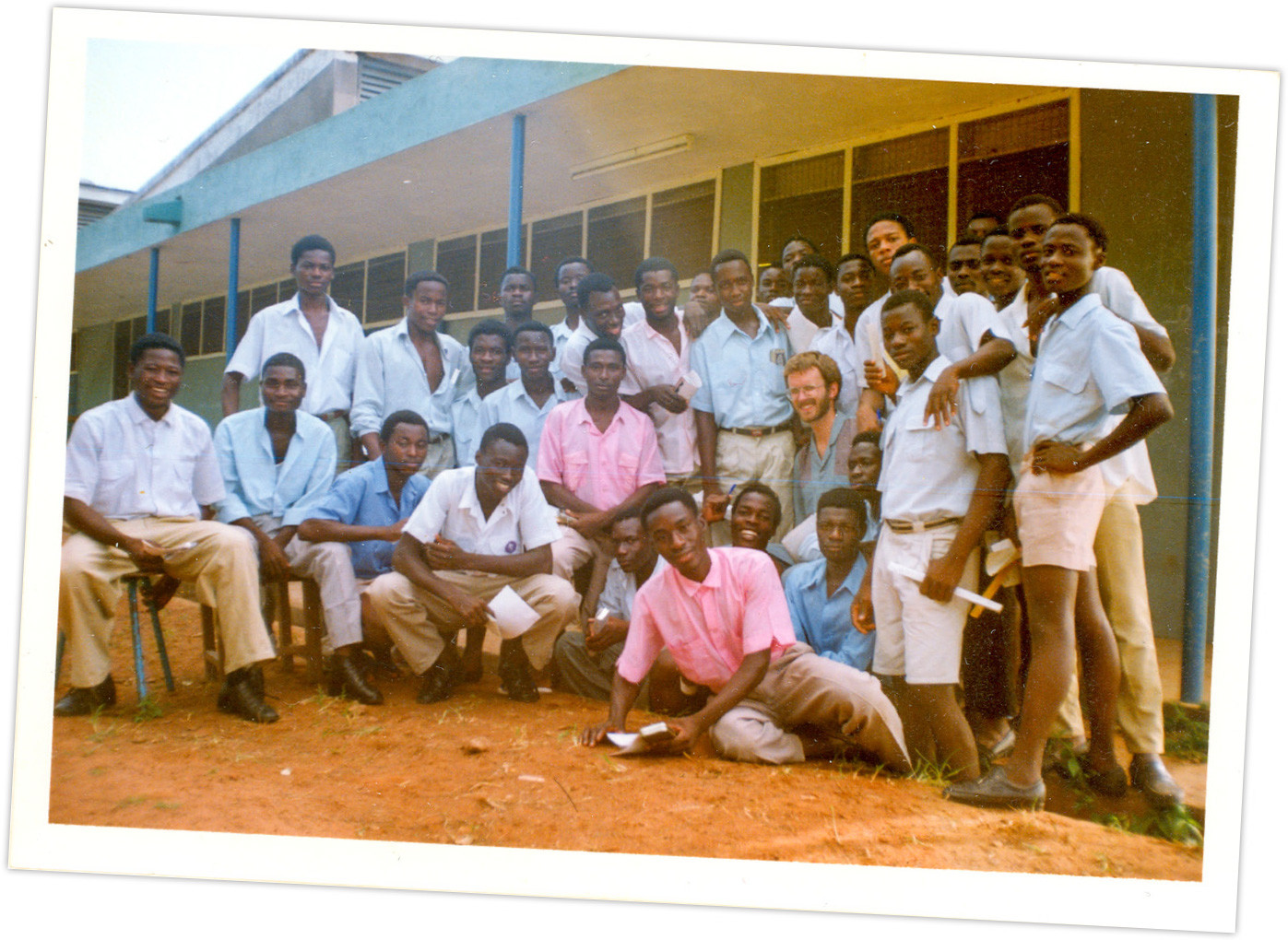
FIGURE 1. A group photo shows the 1992 Ordinary-Level (O-Level) Form 5 science class at Damongo Secondary School taught by Brian Arbic as a Peace Corps volunteer in northern Ghana. Arbic and student Joseph Ansong (both in this photo, both authors) later reconnected and initiated the Coastal Ocean Environment Summer School In Nigeria and Ghana (COESSING). > High res figure
|
In 2008, some of Arbic’s Ghanaian students found him through the internet. At that time, Joseph Ansong was finishing his PhD in applied mathematics with a research focus on internal gravity waves. The two men agreed to meet in person at a Peace Corps 50-year celebration held at University of Michigan, where Arbic is a faculty member. Following that meeting, Ansong joined Arbic’s lab as a postdoc, bringing the pair back together after nearly 20 years. Reunited, they conceived of an oceanography summer school in Ghana. Ansong, a coauthor of this article is now a faculty member at the University of Ghana (UG), and their collaboration in research and education continues. The COESSING origin story is shared at the opening of each school to illustrate how individual relationships can blossom into something that impacts a community.
Evolution of the School, Participants, and Curriculum
The school, participants, and curriculum have undergone continual and substantial evolution through the years (Figure 2). In 2014, Ansong and Arbic undertook an exploratory trip in Ghana, talking to marine scientists at UG, Regional Maritime University (RMU), the University of Cape Coast, and Kwame Nkrumah University of Science and Technology. These institutions, and many others, then sent participants to in-person schools held in Accra, Ghana, from 2015 to 2019. The 2015, 2017, and 2019 schools were hosted by RMU, while UG hosted in 2016 and 2018. The 2015 school had four US-based instructors, one Ghana-based instructor, and roughly 50 Ghanaian participants. During 2016–2019, COESSING grew to about 120 African instructors/participants and 15 Global North instructors/participants per year. Over time, many African participants came from Nigeria, and smaller contingents came from other West African countries.
Motivated by ideas from our larger base of instructors, and by participants’ feedback obtained through written surveys and open group discussions, we expanded the curriculum annually from 2016 to 2019. By 2018 and 2019, COESSING offered boat (Figure 3) and field trips as well as laboratory activities in addition to lectures. Topics covered in lectures included physical oceanography, coastal oceanography, chemical oceanography, fisheries, environmental science, and mapping, among others. Field trips and laboratory activities emphasized instrument deployment, sample collection and analysis, basic fluid dynamics, and other subjects. In 2018, we began to use open-source software (primarily Python, within Jupyter-based computational notebooks) at the school. The Python workshops have become an enduringly popular feature. One 2018/2019 participant, Mumin Oladipo, used Python skills learned at our school to program Raspberry Pis to run his research equipment at much lower cost, thus making his research successful (Oladipo et al., 2021). The training from the summer school improved Oladipo’s research capacity as evidenced in his published research results (e.g., Oladipo et al., 2023). Oladipo, a coauthor, benefited from the COESSING community’s strong networking through which he joined the American Geophysical Union (AGU). The success story of his open-science advocacy was presented at the 2022 fall AGU meeting, where he won the prestigious AGU Outstanding Student Presentation Award (OSPA, 2022).
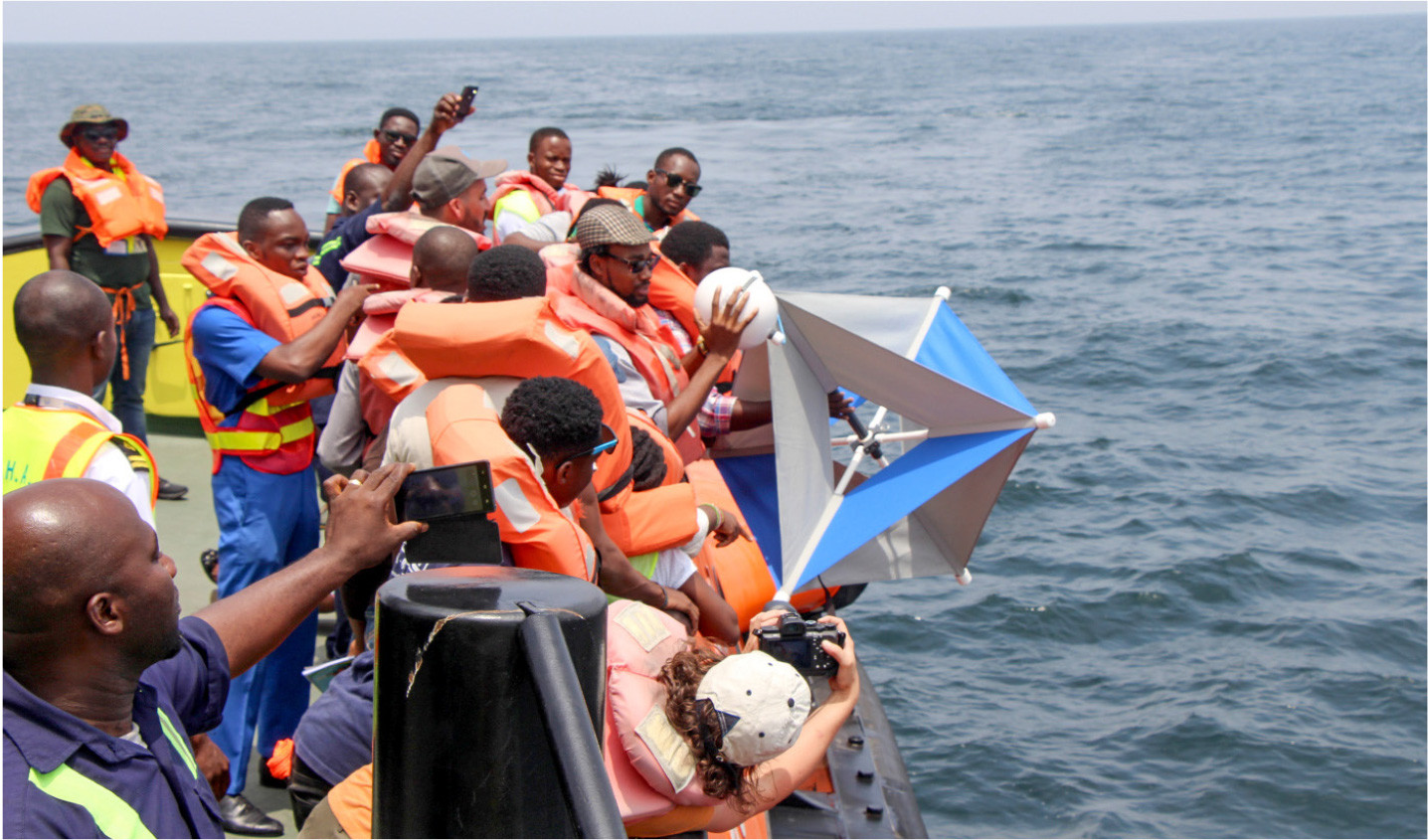
FIGURE 3. A COESSING class deploys a drifter donated by Pacific Gyre Inc. during a boat trip offshore of the Port of Tema, Ghana. The photo includes author Richmond Kennedy Quarcoo, one of the program’s early students who later became an instructor, and author Andrew Lucas. > High res figure
|
We have also taught many COESSING participants how to use satellite observations of the ocean (Nyadjro et al., 2021). For instance, some participants learned how to use satellite observations of sea surface temperatures in their PhD research on fisheries. In 2018 and 2019, we began to form small research projects with a few selected advanced participants who presented their projects at the end of the school. For many of these participants, this was their first-ever opportunity to present PowerPoint talks on research.
In response to the COVID-19 pandemic, we held three online summer schools in 2020 and 2021, with about 100 participants per offering. The online schools featured panel discussions, lectures, and tutorials on ocean acidification, climate and ocean modeling, women in STEM, Python coding, and other topics (see recordings on the COESSING YouTube channel https://www.youtube.com/channel/UChiCQrtC6U06ce3u_4aSKAQ). Online school attendees came from Kenya, India, and Malaysia, as well as West Africa.
We held hybrid in-person/online schools in 2022 and 2023. The in-person 2022 school was held for the first time in Lagos, Nigeria, co-hosted by the University of Lagos and the Nigerian Institute for Oceanography and Marine Research (Figure 4). Nigeria is Africa’s most populous country, with about 220 million people. Because Lagos lies on an estuary, and some studies project that it will be the world’s most populous city by 2100 (Oluwole, 2022), the importance of developing marine science collaborations in Nigeria cannot be understated. The in-person component of the 2023 hybrid in-person/online school was hosted by UG.
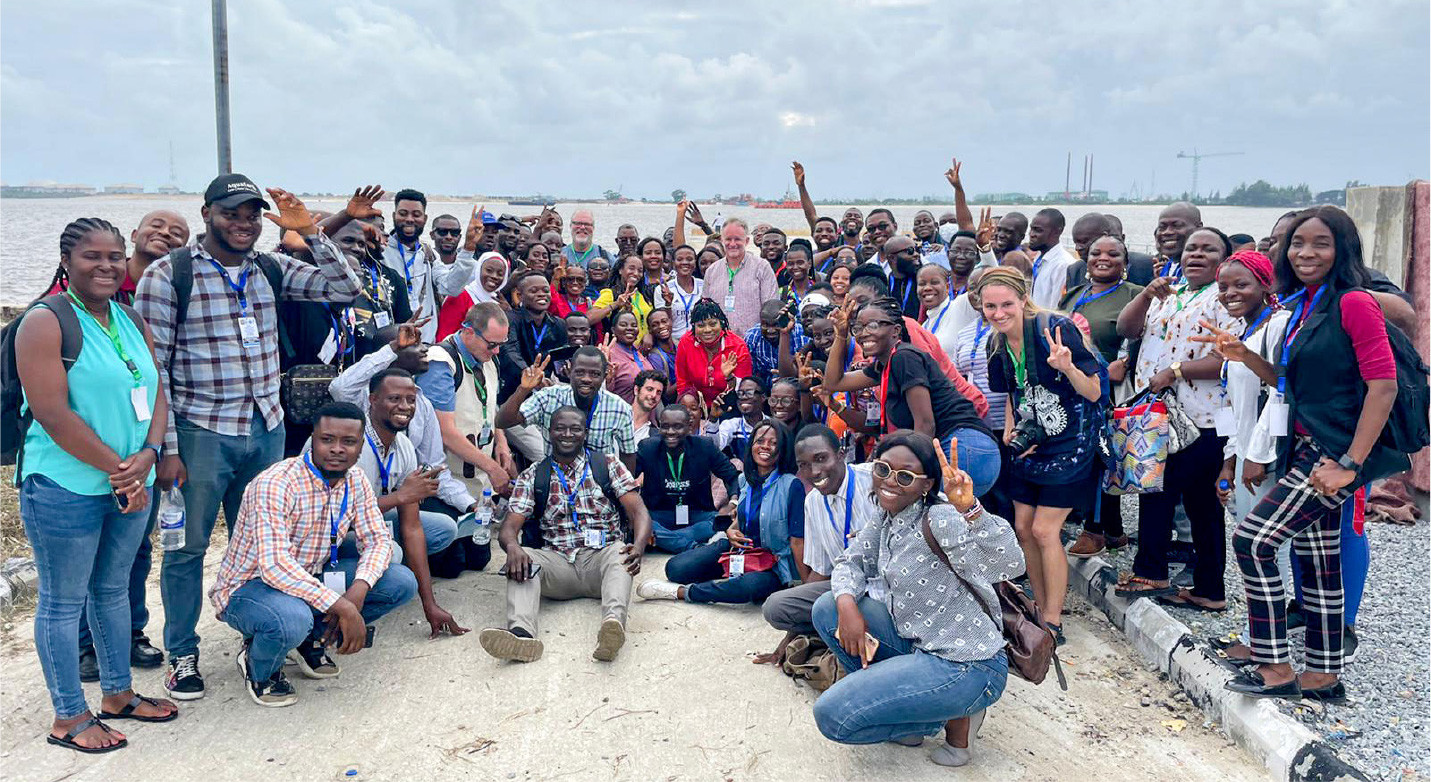
FIGURE 4. Most of the participants in the 2022 COESSING summer school in Nigeria are pictured here. Image credit: COESSING 2022 Local Organizing Committee. > High res figure
|
In 2023, the in-person school focused on hands-on projects in four topic areas—biogeochemistry, fisheries and conservation, the science and policy of plastics, and physical oceanography—with the first three including field trips (Nyadjro et al., 2025, in this issue). The focus on project-based learning was enthusiastically received, and was continued in the 2024 school, held for the second time in Nigeria. The evolution of the school from one based on lectures, laboratory exercises, and field trips, to one based on hands-on project work can be seen through inspection of the school schedules from 2015 to 2024 on the COESSING website.
COESSING participants and instructors, from both Africa and the Global North, include undergraduates, graduate students, faculty members, and employees of government organizations, nongovernmental organizations (NGOs), and the private sector. Faculty participants have often recruited students from their institutions in subsequent years and have acted as multipliers of knowledge gained at COESSING in their respective institutions. The effort required for many participants to travel to our summer schools is truly inspiring. For example, many Nigerians have undertaken multi-day bus trips to attend our COESSING schools in Ghana. In 2023, two East African scientists made long and complex trips across the African continent to attend the 2023 COESSING in person.
The number of applicants has increased over time, and we have had to make difficult admission decisions due to funding restrictions. For example, more than 600 people applied for our 2024 school, and we could only accept about 120. Anyone with an interest in ocean science and who is pursuing an undergraduate degree or has a more advanced degree is welcome to apply to our school. The application process is simple; transcripts and recommendation letters are not needed, but we do carefully read applicant motivation statements. Participants are primarily chosen by a local organizing committee, after some guiding principles have been established. We try to have a balance of new and returning participants each year, and we strive for diversity in gender, geographic region, and career stage. For several reasons, we allow for some returning participants: (1) to better establish long-term relationships that are necessary for real collaboration, (2) to transition some participants into instructor roles, and (3) to allow some participants to benefit from the different emphases that we have from year to year, especially now that we have transitioned to a focus on hands-on research/projects. As the school is run on a voluntary basis, the instructor pool changes from year to year; hence, the topics that are covered can change from one year to the next. For instance, in 2024 the biogeochemistry project offered sub-projects on genomics and sediment coring, because instructors well-versed in those topics were on hand.
Students and other early-career scientists have contributed to instruction, organization, and promotion of the school. Students from several US institutions, including Hampton University, a historically Black university, have participated in COESSING. As detailed on our website, the creation of the COESSING acronym, construction and maintenance of our website and social media sites, and design of our previous and current logos, has been done by students and other early-career professionals.
Entries on our school testimonials page (https://coessing.org/testimonials/) demonstrate positive learning impacts for participants from both West Africa and the Global North. Participants have employed skills that they learned during our schools in their research studies. Moskel et al. (2021) documented learning outcomes with participant surveys and interviews. Many instructors, organizers, and participants have attended COESSING more than once. For instance, author Richmond Kennedy Quarcoo, a participant during our early schools in Ghana, has become an instructor since he started the successful NGO Plastic Punch (https://plasticpunchngo.org/) to combat marine plastic pollution.
Funding
Research funding is critical for promoting international collaboration. The school began with funding that was included in a US National Science Foundation (NSF) CAREER grant to Arbic, who vastly underestimated the interest the school would generate and the required funding needs. The school expansion in 2016–2017 was enabled by support from several offices at the University of Michigan, supplemented with grants from various agencies in Ghana. The 2018–2024 schools were supported by a supplement to the CAREER grant (more properly calibrated to realistic budgetary needs), a newer NSF grant, a US Office of Naval Research (ONR) grant, and internal support from our Nigerian partners. The annual cost, excluding overhead, for the 2016–2024 schools has gradually increased from about $60,000 to $110,000 USD per year.
A recent gift from Schmidt Sciences will fund the international Ocean Margins Initiative (OMI; WHOI, 2024) team to observe and model marine biogeochemistry in the Gulf of Guinea from 2024 to 2029. OMI is one of five teams to be funded, at a cumulative level of $45M USD, by the Schmidt Sciences Ocean Biogeochemistry Virtual Institute. A substantial fraction of OMI funds, including those for training early-career professionals in marine science and technology and for equipment purchases, will go to UG. COESSING will be supported by this Schmidt gift from 2025 to 2028 and will serve as a critical meeting/networking activity for OMI (University of Michigan, 2024). We plan to alternate 2025–2028 schools between Ghana and Nigeria. A significant proposal to obtain access to a large research vessel has been submitted following an ONR workshop held in Ghana in August 2024.
United Nations Endorsement
In 2021, the United Nations Decade of Ocean Science for Sustainable Development (2021–2030) endorsed COESSING as a regional project and our Global Ocean Corps and Conveyor (https://globaloceancorps.org) concept as a global capacity development program. Ocean Corps aims to develop more capacity sharing projects, including summer schools, around the world. Consistent with the Ocean Corps mission, we have expanded COESSING beyond Ghana into Nigeria, procured NSF funding to begin a separate sister school in East Africa, and held informal discussions on potential schools in other locations.
Community Building and Collaboration with Related Efforts
COESSING is a contribution to continuous learning experiences for coastal communities within the Sub-Saharan region aligning with the SDG 17 on partnerships for the goals. Our email list has more than 1,600 recipients. The school has inspired WhatsApp groups that former participants use to post educational, grant, and employment opportunities as well as celebrations of promotions and other milestones. COESSING strives to link up with like-minded efforts. For example, to optimize interrelated collaborations, the 2023 and 2024 annual workshops of the US-West Africa Coastal Resilience Research Consortium, the 2023 West Africa Marine Science Symposium (Mahu et al., 2025, in this issue), a 2024 OMI meeting, and the 2024 ONR-funded workshop noted above, were timed to take place just before or after COESSING schools.
Lessons Learned
First among the most salient lessons we have learned are the values of starting small and of listening intently to a wide variety of ideas as one organizes the school format. Going large from the start might work, and we will probably try that in other regions. However, for our first school in West Africa, it was beneficial to achieve our present large state slowly over time. The growth happened organically, from one annual version of the school to the next, based upon input from instructors and participants. Many major changes to the school, including decisions to (1) add field trips, boat trips, and labs on top of lectures; (2) base the school computing on Python; (3) run virtual schools during the pandemic; and (4) go to Nigeria as well as Ghana, and other changes, were not imposed by the lead PI from the top down but instead were brought forth by other instructors and by participants who carefully watched what we were doing and offered suggestions for improvement.
Another lesson is to be open to serendipity. Many of the improvements to the school took place due to happy circumstances—for instance, bringing a US graduate student (coauthor Paige Martin) to the school with a vague feeling that she would have a good idea and watching with delight as she transformed the way we used computer programming at the school. It is sometimes hard to predict what will go well in an endeavor such as a summer school, but it is easy to predict that bringing talented people together will lead to good ideas, even if it cannot be predicted in advance exactly what those good ideas will be. Another key lesson is that in-person interactions that take place in the Global South environment are very efficient for opening everyone’s eyes to the enormous potential for Global South-North partnerships. In-person interactions cost more, and reach smaller numbers of people, than online interactions, but we have seen repeatedly that they reach people more deeply. Holding the in-person interactions in the Global South creates opportunities and promotes lasting relationships like nothing else can.
We do not pretend to be experts on all the possible ways in which summer schools could be funded, but we hope that our own successes may help others who wish to start similar projects. On three different occasions, beginning with a CAREER proposal, Arbic was able to include substantial support for summer schools as a broader impact in research proposals to NSF. Some of our other instructors have supported travel for themselves and/or their early-career mentees, or their efforts in curricular development, in the broader impacts sections of their own NSF grants. Some of our NASA-funded colleagues have also obtained travel support to attend as COESSING instructors by emphasizing the potential for expanding the user base of NASA products to African scientists. The ONR grant obtained by Arbic in 2022 was focused entirely on supporting the summer school and demonstrates that the US Department of Defense understands the importance of relationship building. Finally, our most recent funding, the gift from Schmidt Sciences, took place for many reasons, but the long-term relationships that West African and Global North scientists have built through COESSING certainly played a role.
Look to the Future
Capacity sharing is an identified priority for the ocean science community and is essential for developing trained professionals to support sustainable blue economies, protect marine ecosystems, and tackle other important marine-related issues (Miloslavich et al., 2022; Osborne et al., 2022; Arbic et al., 2024; IOC-UNESCO, 2024; Saba et al., 2025, in this issue; Valauri-Orton et al., 2025, in this issue). The term “capacity sharing” emphasizes that learning is two-way. Summer schools provide one potential platform and strategy for capacity sharing. Both Global South and Global North participants have described our Nigeria/Ghana summer school as “life-changing.” The reactions to seminars that we have given on COESSING at various venues demonstrate a hunger throughout the ocean science community for such international experiences. If funding for more summer schools existed, it would be easy to find Global South institutions to host them, and it would be easy to find scientists from both the Global South and Global North to participate in them. COESSING’s success shows that long-term sustained summer schools can build the trust necessary for truly collaborative research and education. As we seek to further expand our network, we will explore the potential to include other non-academic stakeholders such as Indigenous people, who are some of the most vulnerable populations to environmental change and who hold necessary ocean conservation knowledge (Sogbanmu et al., 2023), in future summer schools.
ACKNOWLEDGMENTS
We thank two anonymous reviewers and Oceanography Editor Ellen Kappel, all of whom provided useful feedback that helped to improve our manuscript. We thank Emily Shroyer for her participation in the school for many years and for her continuing support of our activities. We thank the >1,000 individuals who have participated in COESSING since its inception. The author list consists of individuals who have served as in-person instructors two or more times and/or who have served on organizing committees one or more times. We thank many others who served as in-person school instructors one time and/or who instructed in our online schools. We gratefully acknowledge financial support from US National Science Foundation grants OCE-1351837 (2015-2018), OCE-1851164 (2019-2024), US Office of Naval Research grant N00014-22-1-2570 (2022-2024), the International Centre for Theoretical Physics (ICTP; 2018), several sources at the University of Michigan (2016–2017), several private funders in Ghana (2015–2017), and internal support from Nigerian hosting institutions (2022 and 2024). The COESSING website (https://coessing.org/) provides a detailed listing of University of Michigan and private Ghana funders.

